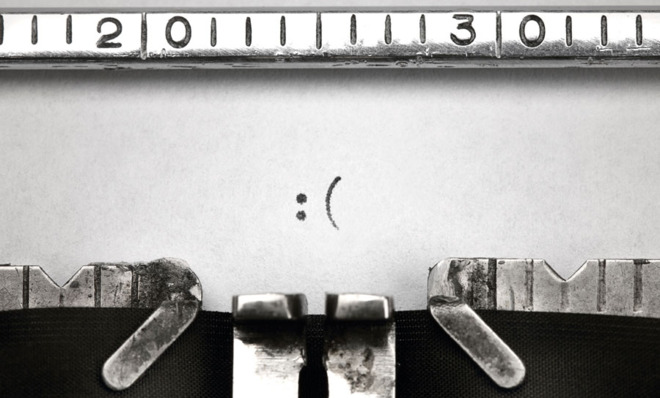The secret emotional lives of 5 punctuation marks
From the angry period to the dramatic asterisk...


A free daily email with the biggest news stories of the day – and the best features from TheWeek.com
You are now subscribed
Your newsletter sign-up was successful
Punctuation is the homely, workaday cousin to the glamorous word. It works quietly in the background, sweeping up and trying to keep the information flow tidy, while words prance around spilling thought, meaning, and feeling all over the place. Punctuation marks accept their utilitarian roles, but they too carry feelings, and they express them in subtle ways that are sometimes easy to miss. Let's take a look at the secret emotional lives of five punctuation marks.
1. THE ANGRY PERIOD
What could be simpler than period? One little dot that ends a sentence, a few pixels. But lately, the period has become a bit more than that. As Ben Crair noted at The New Republic, when it comes to online chatting and texting, the period has come to mean "I am not happy about the sentence I just concluded." Since digital communication is more like an ongoing conversation, people usually leave off final punctuation and just hit send. In that context, a period starts to look a little abrupt and aggressive. A study by Idibon adds support to the idea of the negative period. In an analysis of a corpus of nine million social media interactions, they found that the appearance of a period is highly correlated with a particular phrase beginning with f and ending with you.
The Week
Escape your echo chamber. Get the facts behind the news, plus analysis from multiple perspectives.

Sign up for The Week's Free Newsletters
From our morning news briefing to a weekly Good News Newsletter, get the best of The Week delivered directly to your inbox.
From our morning news briefing to a weekly Good News Newsletter, get the best of The Week delivered directly to your inbox.
2. THE SINCERE EXCLAMATION POINT
The exclamation point has long been seen as a marker of loudness or excitement, but its emotional range is more complex than that. In digital communication it has become a sincerity marker. In an email, where it might seem a little too informal to just leave off end punctuation, the exclamation point serves as a solution to the problem of the angry period. This comes off dry, cold, and little sarcastic: "I am looking forward to the meeting." But with the exclamation point — "I am looking forward to the meeting!" — it is warm and sincere. It adds not a shout, but a genuine smile.
3. THE COY, AWKWARD ELLIPSIS
The ellipsis, a row of three dots, stands for an omitted section of text. But much can be conveyed by omission. It asks the receiver of the message to fill in the text, and in that way is very coy and potentially flirty. "Pizza…" Is that an invitation? An opinion? It sits there waiting for a response. This brings awkwardness into the equation, and the ellipsis (or even the written words "dot dot dot") is another way to say "well this is awkward." The conversation is not over, but someone has to make a move. And the clock ticks uncomfortably on, dot…by dot…by dot…
A free daily email with the biggest news stories of the day – and the best features from TheWeek.com
4. THE DRAMATIC ASTERISK
Asterisks are meant to be noticed. They hold a place in a text for you so you can go match it up with a footnote or comment. But they also have a theatrical bent that goes beyond simple attention holding and crosses over into acting. As discussed by Ben Zimmer in this Language Log post, asterisks (*ahem*) can set off stage directions (*cough*) that tell you (*looks at watch*) about the emotional states (*yawn*) and attitudes (*stares off*)…sorry, (*vigorously blinks eyes*) where was I? Asterisks. They're little jazz hands that say, "look what I'm doing!"
5. THE DULL COMMA
Commas have no inner emotional lives. In the words of Gertrude Stein, "commas are servile and they have no life of their own." Not only that, their dullness can rub off on you. A comma "by helping you along holding your coat for you and putting on your shoes keeps you from living your life as actively as you should lead it." That may sound mean, but the comma really doesn't care. In order to get out there every day to step between words and generally slow things down, it's got to have a businesslike attitude.
Arika Okrent is editor-at-large at TheWeek.com and a frequent contributor to Mental Floss. She is the author of In the Land of Invented Languages, a history of the attempt to build a better language. She holds a doctorate in linguistics and a first-level certification in Klingon. Follow her on Twitter.
-
 Switzerland could vote to cap its population
Switzerland could vote to cap its populationUnder the Radar Swiss People’s Party proposes referendum on radical anti-immigration measure to limit residents to 10 million
-
 Political cartoons for February 15
Political cartoons for February 15Cartoons Sunday's political cartoons include political ventriloquism, Europe in the middle, and more
-
 The broken water companies failing England and Wales
The broken water companies failing England and WalesExplainer With rising bills, deteriorating river health and a lack of investment, regulators face an uphill battle to stabilise the industry
